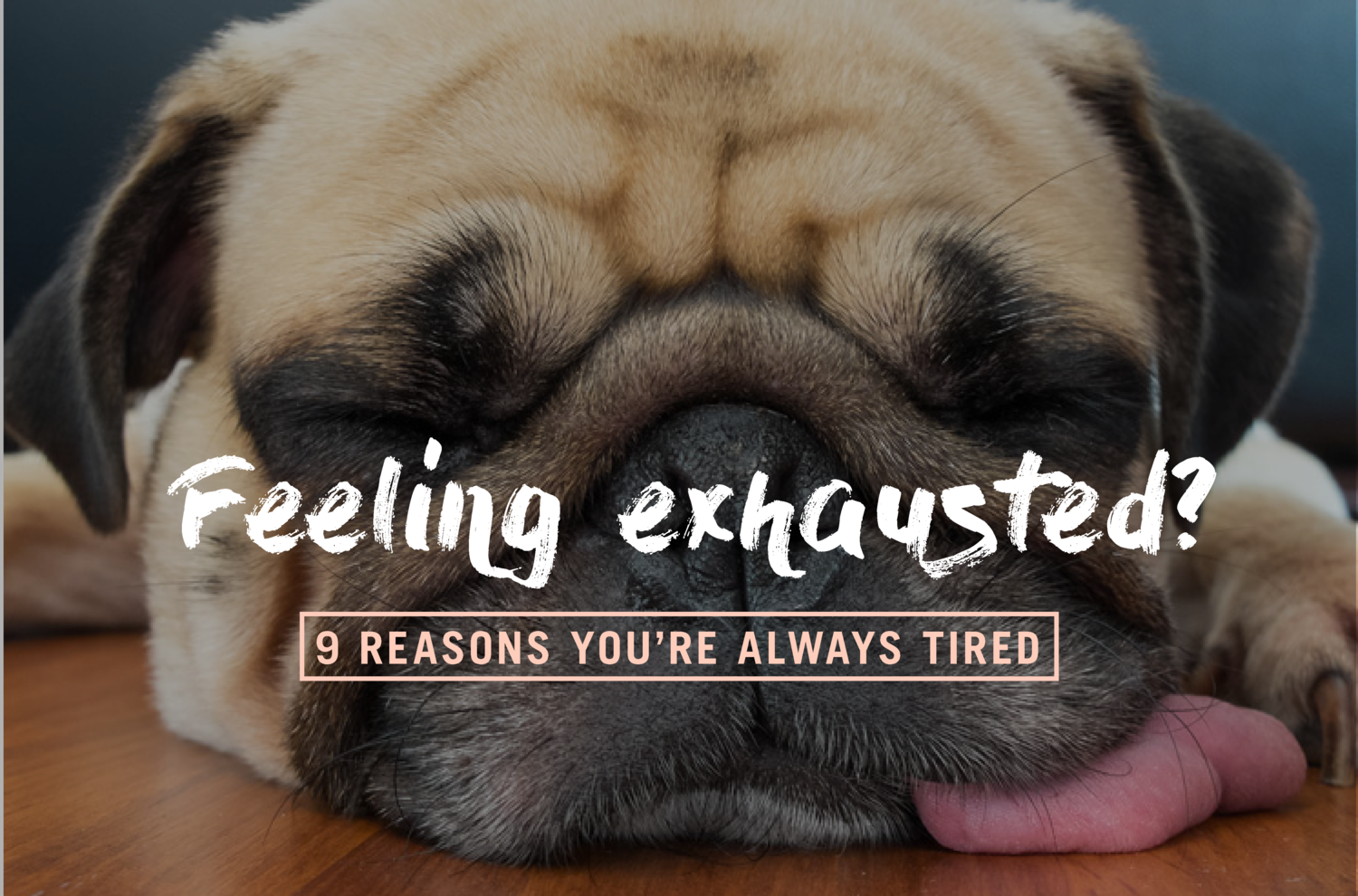9 reasons you’re always tired!
By Martin Ebner
With increasingly busy social lives, family commitments and work schedules, feeling tired from time to time is perfectly acceptable. If however your fatigue is constant and has been going on for quite some time, it may be worth speaking with your doctor to first dismiss any potential illness associated with over-tiredness. Once you receive the all clear, you can relax in the knowledge that it’s nothing serious and begin ruling out the different lifestyle factors that could be affecting your energy levels.
Here are the most common causes of tiredness:
1.) Not enough sleep
This sounds pretty obvious but how many of you can honestly say that you get “enough” sleep? Just in case you didn’t already know, the recommended amount of sleep an average adult should get is between 7 – 8 hours a night.
While a late night here and there will cause you no harm, if you find that it is becoming increasingly difficult to get your dose of shuteye, it may be worth making a few lifestyle changes.
As an experiment, try for one week to get into bed an hour earlier than usual. Just one-hour extra sleep a week adds up to an extra nights sleep a week.
2.) Stress
Stress is terribly draining at the best of times. Neil Shah, director of the Stress Management Society say that "Stress can make you feel drained because of the physical and emotional toll it can take. Your body goes into a state of short-term survival forcing it to work hard to maintain itself in such a state. When we stay in this state for extended periods of time we exhaust the body leaving us feeling drained."
If you feel that stress could be the cause of your tiredness, there are a few different methods you can try to reduce the symptoms. Meditating, yoga, deep breathing techniques and exercise are all great ways to help ease symptoms of stress.
3.) You eat huge portions
Eating all of your calories in one meal might seem like a good idea, but how many of you can honestly say that we felt energetic after overeating in a single sitting?
I appreciate that it isn’t easy to change your eating habits, but if you do have the tendency to eat 1-2 big meals a day, try to break the meals down into smaller bite-sized portions. By supplying your body with fuel little and often, you can prevent energy slumps and enjoy sustained energy throughout the day.
4.) Food intolerance
If you notice that after eating certain foods, you feel crap, it’s possible that you have a food intolerance or you could just be eating crap food?!
If you think that you might have a food intolerance, ask your doctor for advice on a supervised elimination diet or you can take matters into your own hands and try cutting out certain foods that you’ve identified as potential triggers.
5.) Eating too much sugar and fast digesting carbs.
There are 2 types of carbohydrates and it’s important you learn the difference. Fast and slow digesting carbs. Fast digesting carbs include sugar, processed food, white potatoes, rice, pasta and bread and soft drinks. As the name suggests, they are broken down by the body extremely quickly resulting in a sharp and rapid rise in blood sugar levels. Unfortunately, any “high” you do experience is very short lived, followed quickly by an inevitable crash!
Slow digesting carbs, on the other hand, have a very different effect on the body. As the name suggests, they are digested much more slowly. The result is a slow but sustained release of energy in the hours following their digestion. Think whole grain rice, pasta and bread, legumes, fruit and vegetables.
Now, If you’re the sort of person that chases down a breakfast donut with a sugar-laden coffee, I'm not at all surprised that you’re feeling exhausted. At the very least, start the day as you mean to go on with a healthy and balanced breakfast. Wholegrain cereal, fruit and a protein source will not only keep hunger locked up till lunch, but it will also fill the tank with slow-releasing energy that will keep you feeling energized throughout the day.
6.) Not enough exercise
Admittedly, it sounds a little contradictory that a lack of exercise could, in fact, be the cause of your tiredness. Nonetheless, exercise can be a fantastic way to energise your body not only during a workout but after too.
It’s important if new to exercise that you start slowly. Before beginning any sort of exercise program, talk to a personal trainer at your gym or seek guidance from a professional. The more information you can provide them about your fitness level and lifestyle the better they can tailor a workout program to your specific needs.
7.) Too much exercise
Just like with too little exercise, too much can also have a very negative effect on your mood and energy levels. So how much is too much? Well, first of all, It’s important when choosing a workout plan to consider different aspects of your life. Are you under-slept, feeling stressed and anxious or simply have too many social events in your diary? If so, adapt the frequency and intensity of your exercise plan to compliment your lifestyle, not ruin it! Listen to your body and it will tell you everything you need to know how about hard to push yourself on any given day.
8.) Too much caffeine
Admittedly, I do enjoy a good coffee. I think it could be genetic as it seems my entire family seems to live from one coffee to the next. I once saw my uncle drink some 12 coffees over the course of a buffet breakfast whilst on holiday. I remember asking my aunt how does he sleep? her response was simple but clear, he doesn’t!
Caffeine, In moderation, can be just the boost you need to get you through a long business meeting or tough workout but drink too much too often, especially later in the day and it may well prevent you from getting a good night’s sleep.
To avoid caffeine induced sleeplessness, limit your coffee and tea consumption to 3 cups a day and try to avoid highly caffeinated drinks after 3 pm.
9.) Dehydration
So simple yet something that so many of us overlook. According to a survey of 300 general practitioners, dehydration was found to be the cause of low energy is some 20% of cases - that’s 1 in 5 people!
Water cleanses the body and helps eliminate all of the nasty toxins that might be causing you to feel lethargic. If your tiredness is paired with symptoms of poor concentration, head aches and muscle soreness, it could be that your tiredness is the result of dehydration.
Aim to drink at least 8 glasses or 2 litres of water every day. If you exercise regularly or live in a hot country, you can add another 2-3 glasses or 1 litre to the daily figure.





